| Listing 1 - 10 of 13 | << page >> |
Sort by
|
Book
ISBN: 052164819X 1884842658 9780521648196 Year: 1998 Volume: 12 Publisher: Cambridge ; New York : New York : Cambridge University Press ; SIGS Books,
Abstract | Keywords | Export | Availability | Bookmark
 Loading...
Loading...Choose an application
- Reference Manager
- EndNote
- RefWorks (Direct export to RefWorks)
Programming --- Object-oriented methods (Computer science) --- Computer software --- UML (Computer science) --- Development --- Méthode orientée object (Informatique) --- Logiciels --- UML (Informatique) --- Développement --- Computer software - Development
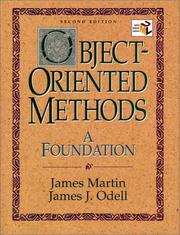
ISBN: 0139055975 9780139055973 Year: 1998 Publisher: Upper Saddle River, N.J. Prentice Hall
Abstract | Keywords | Export | Availability | Bookmark
 Loading...
Loading...Choose an application
- Reference Manager
- EndNote
- RefWorks (Direct export to RefWorks)
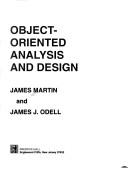
ISBN: 0136302459 9780136302452 Year: 1992 Publisher: Englewood Cliffs, NJ : Prentice-Hall,
Abstract | Keywords | Export | Availability | Bookmark
 Loading...
Loading...Choose an application
- Reference Manager
- EndNote
- RefWorks (Direct export to RefWorks)
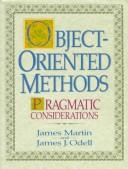
ISBN: 0136308643 9780136308645 Year: 1996 Publisher: Upper Saddle River, N.J. Prentice Hall PTR
Abstract | Keywords | Export | Availability | Bookmark
 Loading...
Loading...Choose an application
- Reference Manager
- EndNote
- RefWorks (Direct export to RefWorks)
Book
ISBN: 0136308562 9780136308560 Year: 1995 Publisher: Englewood Cliffs (N.J.) : Prentice-Hall,
Abstract | Keywords | Export | Availability | Bookmark
 Loading...
Loading...Choose an application
- Reference Manager
- EndNote
- RefWorks (Direct export to RefWorks)
Object-oriented methods (Computer science) --- 681.3*D21 --- Object development methods (Computer science) --- Object orientation (Computer science) --- Object-oriented development (Computer science) --- Object technology (Computer science) --- 681.3*D21 Requirements/specifications: languages methodologies tools (Software engineering)--See also {681.3*D31} --- Requirements/specifications: languages methodologies tools (Software engineering)--See also {681.3*D31} --- Requirements/specifications: languages; methodologies; tools (Software engineering)--See also {681.3*D31} --- 681.3*D21 Requirements/specifications: languages; methodologies; tools (Software engineering)--See also {681.3*D31} --- System design --- Object-oriented programming (Computer science) --- Object-oriented methods (Computer science).
Digital
ISBN: 9783540305781 Year: 2005 Publisher: Berlin Heidelberg Springer-Verlag GmbH
Abstract | Keywords | Export | Availability | Bookmark
 Loading...
Loading...Choose an application
- Reference Manager
- EndNote
- RefWorks (Direct export to RefWorks)
Computer science --- Programming --- Computer architecture. Operating systems --- Artificial intelligence. Robotics. Simulation. Graphics --- Computer. Automation --- programmeren (informatica) --- programmeertalen --- software engineering --- KI (kunstmatige intelligentie) --- computernetwerken --- robots
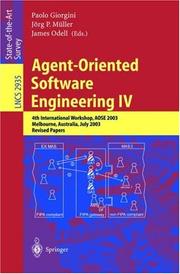
ISSN: 03029743 ISBN: 128030670X 9786610306701 3540246207 3540208267 Year: 2004 Volume: 2935 Publisher: Berlin, Heidelberg : Springer Berlin Heidelberg : Imprint: Springer,
Abstract | Keywords | Export | Availability | Bookmark
 Loading...
Loading...Choose an application
- Reference Manager
- EndNote
- RefWorks (Direct export to RefWorks)
The explosive growth of application areas such as electronic commerce, ent- prise resource planning and mobile computing has profoundly and irreversibly changed our views on software systems. Nowadays, software is to be based on open architectures that continuously change and evolve to accommodate new components and meet new requirements. Software must also operate on di- rent platforms, without recompilation, and with minimal assumptions about its operating environment and its users. Furthermore, software must be robust and autonomous, capable of serving a naive user with a minimum of overhead and interference. Agent concepts hold great promise for responding to the new realities of so- ware systems. They o?er higher-level abstractions and mechanisms that address issues such as knowledge representation and reasoning, communication, coor- nation, cooperation among heterogeneous and autonomous parties, perception, commitments, goals, beliefs, and intentions, all of which need conceptual mo- ling. On the one hand, the concrete implementation of these concepts can lead to advanced functionalities, e.g., in inference-based query answering, transaction control, adaptive work?ows, brokering and integration of disparate information sources, and automated communication processes. On the other hand, their rich representational capabilities allow more faithful and ?exible treatments of c- plex organizational processes, leading to more e?ective requirements analysis and architectural/detailed design.
Software engineering --- Intelligent agents (Computer software) --- Computer science. --- Software engineering. --- Logic design. --- Artificial intelligence. --- Engineering & Applied Sciences --- Computer Science --- Computer programming. --- Programming languages (Electronic computers). --- Computer logic. --- Computer Science. --- Software Engineering/Programming and Operating Systems. --- Software Engineering. --- Programming Techniques. --- Programming Languages, Compilers, Interpreters. --- Logics and Meanings of Programs. --- Artificial Intelligence (incl. Robotics). --- AI (Artificial intelligence) --- Artificial thinking --- Electronic brains --- Intellectronics --- Intelligence, Artificial --- Intelligent machines --- Machine intelligence --- Thinking, Artificial --- Bionics --- Cognitive science --- Digital computer simulation --- Electronic data processing --- Logic machines --- Machine theory --- Self-organizing systems --- Simulation methods --- Fifth generation computers --- Neural computers --- Computer science logic --- Logic, Symbolic and mathematical --- Computer languages --- Computer program languages --- Computer programming languages --- Machine language --- Languages, Artificial --- Computers --- Electronic computer programming --- Electronic digital computers --- Programming (Electronic computers) --- Coding theory --- Computer software engineering --- Engineering --- Informatics --- Science --- Programming --- Artificial Intelligence. --- Design, Logic --- Design of logic systems --- Digital electronics --- Electronic circuit design --- Logic circuits --- Switching theory
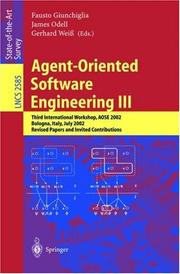
ISBN: 354000713X 3540365400 9783540007135 Year: 2003 Volume: 2585 Publisher: Berlin, Heidelberg : Springer Berlin Heidelberg : Imprint: Springer,
Abstract | Keywords | Export | Availability | Bookmark
 Loading...
Loading...Choose an application
- Reference Manager
- EndNote
- RefWorks (Direct export to RefWorks)
Over the past three decades, software engineers have derived a progressively better understanding of the characteristics of complexity in software. It is now widely recognised thatinteraction is probably the most important single char- teristic of complex software. Software architectures that contain many dyna- cally interacting components, each with their own thread of control, and eng- ing in complex coordination protocols, are typically orders of magnitude more complex to correctly and e?ciently engineer than those that simply compute a function of some input through a single thread of control. Unfortunately, it turns out that many (if not most) real-world applications have precisely these characteristics. As a consequence, a major research topic in c- puter science over at least the past two decades has been the development of tools and techniques to model, understand, and implement systems in which interaction is the norm. Indeed, many researchers now believe that in future computation itself will be understood as chie?y a process of interaction.
Software engineering --- Intelligent agents (Computer software) --- Computer science. --- Science. --- Computer communication systems. --- Software engineering. --- Programming languages (Electronic computers). --- Computers. --- Computer Science. --- Software Engineering/Programming and Operating Systems. --- Science, general. --- Theory of Computation. --- Software Engineering. --- Computer Communication Networks. --- Programming Languages, Compilers, Interpreters. --- Automatic computers --- Automatic data processors --- Computer hardware --- Computing machines (Computers) --- Electronic brains --- Electronic calculating-machines --- Electronic computers --- Hardware, Computer --- Computer systems --- Cybernetics --- Machine theory --- Calculators --- Cyberspace --- Computer languages --- Computer program languages --- Computer programming languages --- Machine language --- Electronic data processing --- Languages, Artificial --- Computer software engineering --- Engineering --- Communication systems, Computer --- Computer communication systems --- Data networks, Computer --- ECNs (Electronic communication networks) --- Electronic communication networks --- Networks, Computer --- Teleprocessing networks --- Data transmission systems --- Digital communications --- Electronic systems --- Information networks --- Telecommunication --- Cyberinfrastructure --- Network computers --- Natural science --- Science of science --- Sciences --- Informatics --- Science --- Distributed processing --- Information theory. --- Science, Humanities and Social Sciences, multidisciplinary. --- Communication theory --- Communication --- Software engineering - Congresses --- Intelligent agents (Computer software) - Congresses
Book
ISBN: 051100155X 9780511001550 1884842658 9781884842658 052164819X 9780521648196 Year: 1998 Publisher: [Place of publication not identified] Cambridge University Press
Abstract | Keywords | Export | Availability | Bookmark
 Loading...
Loading...Choose an application
- Reference Manager
- EndNote
- RefWorks (Direct export to RefWorks)
Book
ISBN: 9783540305781 Year: 2005 Publisher: Berlin Heidelberg Springer Berlin Heidelberg
Abstract | Keywords | Export | Availability | Bookmark
 Loading...
Loading...Choose an application
- Reference Manager
- EndNote
- RefWorks (Direct export to RefWorks)
The explosive growth of application areas such as electronic commerce, ent- prise resource planning and mobile computing has profoundly and irreversibly changed our views on software systems. Nowadays, software is to be based on open architectures that continuously change and evolve to accommodate new components and meet new requirements. Software must also operate on di?- ent platforms, without recompilation, and with minimal assumptions about its operating environment and its users. Furthermore, software must be robust and ¨ autonomous, capable of serving a naive user with a minimum of overhead and interference. Agent concepts hold great promise for responding to the new realities of software systems. They o?er higher-level abstractions and mechanisms which address issues such as knowledge representation and reasoning, communication, coordination, cooperation among heterogeneous and autonomous parties, p- ception, commitments, goals, beliefs, and intentions, all of which need conceptual modelling. On the one hand, the concrete implementation of these concepts can lead to advanced functionalities, e.g., in inference-based query answering, tra- action control, adaptive work?ows, brokering and integration of disparate inf- mation sources, and automated communication processes. On the other hand, their rich representational capabilities allow more faithful and ?exible treatments of complex organizational processes, leading to more e?ective requirements an- ysis and architectural/detailed design.
Computer science --- Programming --- Computer architecture. Operating systems --- Artificial intelligence. Robotics. Simulation. Graphics --- Computer. Automation --- programmeren (informatica) --- programmeertalen --- software engineering --- KI (kunstmatige intelligentie) --- computernetwerken --- robots
| Listing 1 - 10 of 13 | << page >> |
Sort by
|

 Search
Search Feedback
Feedback About
About Help
Help News
News